- Home
- Marie Rutkoski
The Hollow Heart Page 11
The Hollow Heart Read online
Page 11
The serving tray is complete. The bread, the bowl of garnet fruit, the cup of warm milk. My hands rest on either side. They are no lady’s hands. Usually that makes me feel good. I like my nails cut to the quick, the strong knobs of knuckles, palms calloused from years of weapons training and the skid of a ship’s ropes. But today they look useless, helpless, as I think about how a month has passed since I left Ethin. I do not know Nirrim’s fate. I will never know. But I cannot imagine that she is safe, not when she was ready to risk everything to save her people, and had no one to protect her.
Yet she would not come with me. I asked. I begged.
Enough. Remembering doesn’t help me. It is painful. I grab the tray with such vehemence that a cook, who had been politely giving me a wide berth, shoots me a startled glance. I ignore it, and bear the tray to my mother.
* * *
She is awake. She smiles to see me, though I can tell she is too weak to shift herself up against pillows behind her, so I help until she catches my hand in hers and says, “You are a good child.”
I could say: Yes, when I do what you want. Or: I am not a child.
I feel hot, my face tight. How often have I wanted to hear her say what she has just said? It comes now, but too late, and not because of who I am but because I am taking care of her. Maybe someone would say that taking care of my mother is who I am, that it is what I always want to do for those I love, but I would insult that person, mock them as a fool, even when I know the words to be true.
I do not know what to do with my anger. I do not understand how it constantly feeds itself, how sweet it is, how I need it so badly.
My eyes prickle. I place the tray beside her. “What does that yellow feather mean?”
She glances around her bedchamber, her brow furrowed. “The yellow feather?”
Indeed, it is not here, not now. “The one that is sometimes in your suite, sometimes in Etta’s. Small, and speckled. I don’t know from which bird.”
“A southern bird,” she says, her voice tired, dreamy. She has fallen into some memory that has nothing to do with me.
“If I am such a good child, maybe you should give it to me.”
She blinks up at me, confused. I have rarely seen her confused. She pushes bright hair off her brow to look at me better. “Why would you want a feather?”
I shrug.
“I found it during the second war,” she says, “when I was on a campaign with your father. We were traveling, fresh from a battle, and discovered an ancient temple to the gods. It was overgrown. That temple meant so much to Arin. The Valorians had destroyed most temples during the colonization of Herran. We pulled away the vines and saw mosaics of gods I did not even recognize. He believes in more than just the gods. He believes they will return, though he is too shy to say so.” She glances at a window. It is full of pink dawn. The light touches her face softly, and she looks no older than I am. “I saw his wonder. His hope that not everything was lost. Do you understand? And I knew I loved him. I kept the feather as a memory of that day, and gave it to him when he went into battle without me. I told him to return it to me when he had won. I suppose…” Her voice trails off, and again I feel that I am not even here, that she is speaking into the past. “I believed it would keep him alive.”
I say nothing. Longing fills me. I want the feather even more, now that I understand how impossible it would be for her to give it to me.
“It is yours, Sid, if you would like it.”
“It is?”
“You will have to be content with my promise. Arin has it, for now.”
“Oh,” I say, realizing that the feather is as much his as hers, and maybe he would not like me to have it. I flush. All this over a feather.
She understands my worry in an instant, of course. I believed I had gotten better at not showing my every thought, but she is who she is, like that bowl is a bowl, and there is never any hiding from her. “He would want you to have it, knowing it means something to you.”
The cup of milk will grow cold. I lift the porcelain cap, designed to guard warmth, from the cup’s brim and offer the milk to her. “Only I will serve your meals.”
She drinks. “That is wise.”
“It is common sense. I am surprised you did not restrict your meals earlier to the hands of someone you trust.”
“I was too tired.” She bites her lip. “I wasn’t thinking straight. I feel better.”
“Not so sick?”
“Not so hopeless,” she says, “now that you have returned.”
I shift in the seat beside her, my dagger digging into my side. I don’t want to feel the softness that steals through me. What can I say? Her words are so tender that they hurt. They are what I want, yet she doesn’t even know what it cost me to leave Ethin, how I had to give up my heart to be by her side.
She lets the silence linger, then says, “I wish you had a friend. You never really did.”
“I have Roshar. Emmah. Things were always complicated with anyone else.”
“You did ignore young men. Instead you seduced women whom you befriended, and then abandoned them. Hardly a model for lasting relationships.”
The dagger’s pommel jabs my ribs. I stand, towering over her. “What would you know about my relationships?”
Quietly, she says, “Only what you tell me.”
“Don’t act like you were so heartbroken over my departure. You know why I left.”
“That night, we barely spoke. You shouted at me. You wouldn’t let me get a word in edgewise.”
“Because I knew what you would say!”
She sets the empty cup in its saucer. “Let me remind you, Sidarine, that it was you who chose to be engaged to Prince Ishar of Dacra. You said that you would. You said it was what you wanted.”
It is true, and I cannot bear it. I storm from the room.
* * *
“Oooh, I know that look,” Roshar says slyly from the low bench opposite the fountain in the atrium, stopping me as I speed through the house like a shot bullet. If I enjoy the atrium, he does so even more, especially this time of year, when heat drains from the air. So cold, your country, he always says, shivering. Once the leaves change color he returns to Dacra, complaining that the wind bites his bones. The atrium, with its peaked glass roof, traps the heat on a sunny day. White flowers, their petals thick as curls of shaved soap, look up at me from their green beds along the fountain. Roshar lounges on the bench like it is a bed, faceup, head pillowed on arms crossed behind him, one long leg dangling. I recognize the way he looks, because I have tried to appear this way many times—careless, seductive, lazy, clever. I have endeavored so much over the years to imitate Roshar that sometimes when I see him like this I do not know if he is simply being himself or imitating me imitating him. “Why are you even here?” I demand.
“To muse upon the sweet scent of the flowers, Princess.”
“Not here, the atrium. Here, Herran. You did your duty to my parents and dragged me home. Your ship waits in the harbor. The weather grows cold. Why don’t you return to Dacra, Prince?”
“I am needed where I am.”
I renew my suspicion of him. My mother trusts him wholly. He was visiting Herran before he sailed to Ethin to collect me. He could have poisoned her, then been compelled, in order to pretend his continued loyalty, to seek me out at my parents’ request. If he claims he is needed here, could it be to finish the assassination he began?
He sits up, the lines of his body loose and lithe, an open reminder of how deadly he is as a fighter. Fearless. Quick to attack. Yet his sleek, black eyes are tender when he says, “Sid, I have stayed for you.”
“Me?”
“Who else?”
“Well … my parents.”
“Not this time.”
“But you sailed to Ethin for me, for their sake.”
“Yes. But I also did that for you.”
The fountain whispers. The humid, perfumed air of the atrium feels like a veil over my face. He says,
“When I received word that you were in the city of Ethin’s prison with an evidently charming local girl, and that you both needed to be released on my royal authority, I did as you asked, and left you alone. Were your parents wrecked with worry, wondering where you were? Yes. Am I their dearest friend? Yes. Did I tell them where you were? No. You are my godchild, and I swore to take care of you as though you were my own. You ran away. You insisted upon your freedom. Who was I to take it? Was it not my role, as your godfather, to give you what you needed?”
I sit beside him on the bench, my anger and suspicion dampened by surprise.
“But when Kestrel fell ill,” he says, “I had to come find you.”
“To make me come home.”
“Sid, no one has made you do anything.”
My throat tightens. I stare at the tumbling water.
“I know a little,” Roshar says, “about making a mistake, and grieving it. I didn’t want that to happen to you. Your mother is dying. I knew that Kestrel held the hand of the goddess, and might walk with her forever. If she died, and you learned of it later, you would never forgive yourself for missing the chance to say good-bye. I came to Ethin to give you a choice.”
This hadn’t occurred to me. When he came to me in my house in Ethin with the news, my need to return home was so strong that it never felt like a choice. And although I asked Nirrim to come with me, I nevertheless chose my family first. It occurs to me how deeply I might have hurt Nirrim, even if she understood my choice, and that when I begged her to be by my side and live with me in my country it was so that I need not feel the pain of choice, and not surrender anything—neither the girl I loved, nor my mother.
“I think it would be easier for you,” Roshar says, “to blame me for forcing your return. But it is not the truth.”
I sigh. “Doesn’t someone miss you in Dacra? Your sister?”
“The queen hates me.”
“Your tiger?”
“Arin will climb all over me when I return, and lick off what remains of my face. He will consider eating me, but I will remind him that I do not taste good to tigers. He will lean against me, and purr down to his bones. I have that effect on men.”
“Surely you have a lover who wants your return.”
“Loads of lovers.”
I look at him sideways.
“Kestrel and Arin have a true love enshrined by the heavens,” he says, “but that is not for everybody.”
“I know.” I can’t quite keep the wistfulness out of my voice.
“I mean: not everyone wants that. The way I live makes me happy. Why must I be with one person until the day I die? How dull.”
“I suppose.”
He looks at me narrowly. “Do you not agree? Given your reputation—”
“Yes,” I lie. “I agree.” I feel too raw to say otherwise, though I now understand that what he has told me about himself I have long already known, and that the way I have—as people like to put it—run through women is because I have yearned to resemble Roshar in every way, including the freedom of his heart. I have been afraid of loving someone like my parents love each other. To love like that is to live with the knowledge that the end will come, one way or the other, because we are mortal, and the loss will be incalculable. Better, I always thought, without realizing that I thought it, to love lightly, and never lose too much.
It’s hard to want something and deny you want it, to long for the very thing you’re afraid of. Anger spouts up again inside me. I am angry at everyone. I am angry at myself.
“I note,” he says, “that you were stomping and stalking your way from the east wing.”
“My mother is impossible.”
“Terrible! Imperious and calculating.”
“Exactly.”
“And a sore loser!”
“That’s you, Roshar. You always lose when you play her at cards, Borderlands, Bite and Sting—”
“You are an ungrateful child.”
“Will you really not leave?” My voice is small. “Even when it grows cold?”
“Even then.”
“And when it snows?”
“Snow is nothing to me. I laugh at snow.”
My eyes sting. He roughs up my hair as though I were a boy. I lean into his hand, then rest my head on his shoulder, grateful … and guilty for ever suspecting him. “She is so sick,” I say.
“I know.”
“She makes me so angry.”
“Fight me, then, and feel better … at least until you lose.”
I look up at him. It has been a long time since we sparred.
“As your godfather,” he says primly, “I retain the right to exploit any vulnerability of yours and trounce you so that you acknowledge I am superior at hand and sword and am generally the best you shall ever know, or have the honor to encounter. This is all for your personal growth, of course. To make you a better warrior, even if you cannot possibly be as good as I am.”
“You do look out for me.”
He smiles. “In my own way.”
* * *
We walk out into the sunshine, Roshar tipping his face up to it as though he were his tiger, and cross the lawn to the fighting salle my father designed. It is a simple wooden structure about as large as the stables and not very different from them, with sandy rings open to the air, some unroofed, so that he could train me to fight in snow and rain. Other rooms, where I learned how to fight with short knives and defend myself without ever being able to extend my arms fully, are boxed in tight like a horse’s stall. Once, when my father and I left the salle, sweaty and tired, he claimed I could wield any weapon with grace, and we had exhausted all that the salle had to offer, had fought in its every corner. My gaze floated to the roof. He noticed, eyes widening. You are just like your mother, he said with a smile. When we returned to the salle with a ladder, he pinned my shoulder in one heavy hand just as I set my foot on the first rung. His expression pretended humorous anxiety, but his voice was serious enough when he said, Don’t tell Kestrel.
Then we fought on the roof, and I fell only once.
In the weapons room, Roshar chooses a Dacran blade, long and slim, with a blade that curves slightly to its point. I lift one brow.
“Youngling, do not give me that look,” he says. “Find another slipwater blade for yourself and let’s begin.”
“Are you that afraid to lose to me at fighting that you must choose a weapon you’ve wielded since the time you could toddle?”
“So rude to your elders. You should look upon me with naught but awe. Now, I prefer one of the rings open to the sky. I want to drink in the sunshine while it lasts.”
I choose a slipwater blade lighter than his, and longer, to give me greater reach, and unbuckle my dagger so that I may strap this weapon in its place.
“No one beats me,” he says, “let alone a little half-grown Herrani.”
“No one?”
“Your father is good, I allow, but he cheats.”
“Cheats how?”
“He is too big.”
“That is not cheating.”
“Uncannily gifted.”
“I do not think you are proving your point.”
“He is not natural! His god helps him. How can you best someone blessed by the god of death? That is how he cheats.”
“You don’t believe in our gods. I’m not even sure you believe in your goddess.”
We walk into an achingly bright ring. The sand beneath my boots is washed white by the sun, so that it looks like thinly spread cream.
“Faith can be a choice,” he says. “I choose to believe in my goddess, because I want to believe in mystery, in another world I cannot see until I die. It makes my life better to feel that something waits beyond it.”
“Philosophizing will let you stall only so long, Godfather, before I beat you.”
“So cocky! Wager me, then, if you are so sure of yourself.”
“What stakes?” My mother warned that I should never ask this question, that
I should instead seize the opportunity to set the stakes myself, rather than let an opponent make the first move by setting terms that suit him, but I am tired of listening to my mother, tired of how her voice rings in my mind. Anyway, I disagree. Sometimes there is an advantage to hiding what you want, and making your opponent show his wants first.
“If I win,” he says, “I will ask a question, and you will answer.”
“Questions and answers are highly irregular stakes.”
He laughs. “Not in your family. Now put up your blade, and promise you will answer honestly when you lose. Swear by your gods.”
“Roshar, I am always honest.”
“You lie all the time. You have lied just now. Now swear by your gods. The full pantheon, please.”
“Very well, I swear by the hundred to be honest. But I want something different, when I win.”
“If.”
“Give me your ship.”
Roshar shifts in surprise, and the sun catches his blade and turns it to ice. “My ship cost a fortune. She is the swiftest in the Dacran fleet.”
“I know.”
“My prized possession. You do realize that it is worth, say, a minor country? Like one of those Caynish islands. Not even the smallest one. A midsized island.”
“I could have asked for Arin the tiger.”
“Arin is mine.” He tsks. “Are you planning to leave again so soon? To sail back to your Herrath sweetheart?”
“No,” I say, and mean it. I just want a ship that is mine, truly mine. One that I don’t have to steal. I am beginning to worry that to find my mother’s poisoner, I might need to travel somewhere swiftly. The answer begins with you, my grandfather said, and if it is true that my leaving Herran prompted an assassin to attack my mother, it could be for political reasons: because a foreign enemy saw an opportunity to further destabilize the Herrani monarchy, a process I had already begun by vanishing. For now, I must stay close to home. So long as I monitor what my mother eats and drinks, she might recover. Already, this morning, she seemed better. But the assassin might strike again. I wonder, however, whether I will need to sail to Valoria to gather information, or even the Cayn Saratu, where the band of Valorians unhappy with the dismantling of the Empire lurk, and plot against Verex … and possibly against his allies, like my mother.

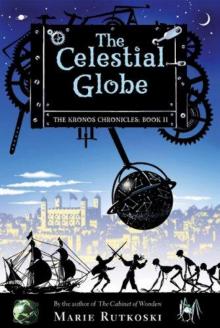 The Celestial Globe
The Celestial Globe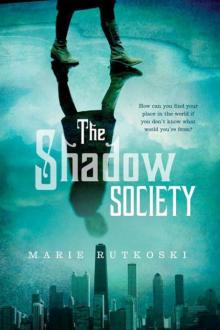 The Shadow Society
The Shadow Society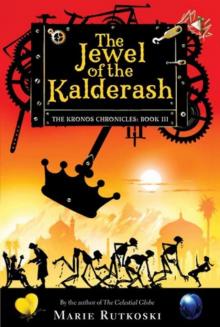 The Jewel of the Kalderash
The Jewel of the Kalderash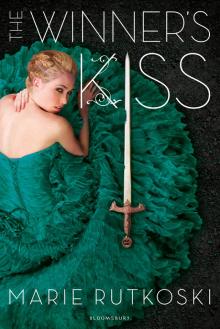 The Winner's Kiss
The Winner's Kiss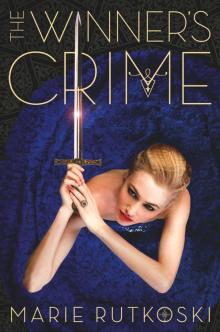 The Winner's Crime
The Winner's Crime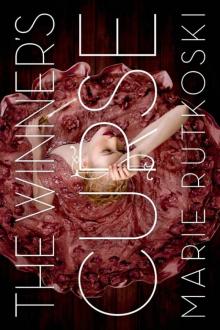 The Winner's Curse
The Winner's Curse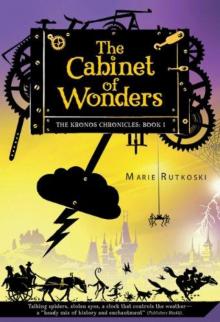 The Cabinet of Wonders
The Cabinet of Wonders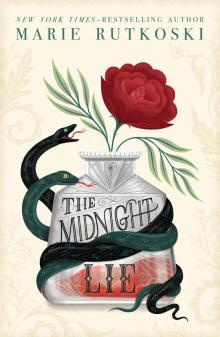 The Midnight Lie
The Midnight Lie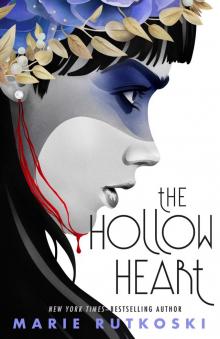 The Hollow Heart
The Hollow Heart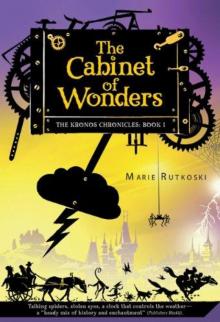 The Cabinet of Wonders: The Kronos Chronicles: Book I
The Cabinet of Wonders: The Kronos Chronicles: Book I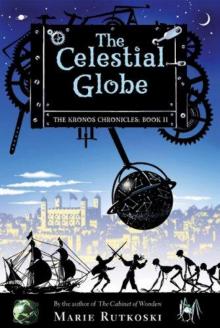 The Celestial Globe: The Kronos Chronicles: Book II
The Celestial Globe: The Kronos Chronicles: Book II